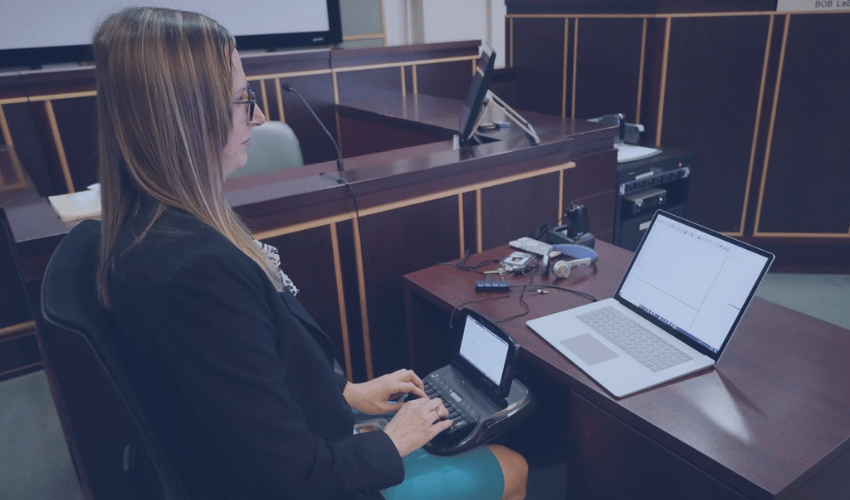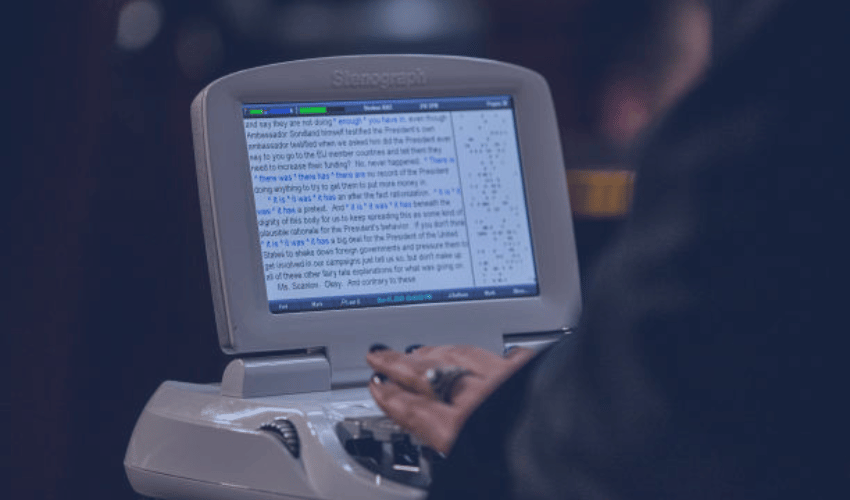How Legal Videography Enhances Court Proceedings
Imagine this: In court, a crucial eyewitness gives conflicting statements, causing doubt and confusion. Now imagine a video recording that captures the witness's demeanor and exact words from a past deposition. That's legal videography. It involves recording, but it's about more than just that. It's about revealing the truth.
Introduction to Legal Videography in Court Proceedings
In the heart of legal battles, where truth and justice collide, emerges a silent yet powerful player: legal videography. Gone are the days when court proceedings relied solely on handwritten notes and subjective interpretations. Today, legal videographers provide an objective eye, documenting every word, gesture, and emotion with unwavering accuracy.
Overview of Legal Videography
Legal videography is the practice of recording legal proceedings using professional video equipment. This encompasses a range of events, from depositions and trials to arbitrations and settlement conferences. Unlike your average home video, legal videography services demand adherence to specific legal standards and guidelines. A certified legal videographer, equipped with specialized knowledge and equipment, ensures a crystal-clear and legally admissible recording.
Importance in the Legal System
The role of legal videography extends far beyond mere documentation. By providing an unbiased account of events, it plays a pivotal role in:
Preserving Testimony: Memories fade, but video recordings remain a permanent fixture. This is particularly critical for legal video depositions, which often occur months or even years before a trial.
Enhancing Accuracy: A video recording eliminates the risk of misinterpretations or biases that can arise from handwritten notes or recollections.
Strengthening Arguments: Visual evidence, such as a witness's demeanor or inconsistencies in their statements, can significantly impact the outcome of a case.
Preparing for a Video Deposition
Now that we understand the significance of legal videography, let's delve into the practicalities. Whether you're an attorney preparing a witness or an individual facing a deposition, preparation is critical:
Understanding the Process: Familiarize yourself with the deposition process, including the videographer's role, permissible objections, and proper etiquette.
Choosing the Right Videographer: Selecting a certified legal videographer ensures experience, professionalism, and adherence to legal standards.
Presenting Yourself Professionally: Dress appropriately, maintain good eye contact with the questioning attorney, and speak clearly and concisely.
Enhancing the Quality of Evidence
In legal proceedings, the quality of evidence can be the difference between a favorable outcome and a dismissal. That's why it's becoming increasingly important to find ways to enhance the quality of evidence, and that's where legal videography comes in. Legal video production can be utilized in a variety of ways, such as capturing witness testimony or documenting evidence at a crime scene. By providing a visual and audio record, legal videography can help to create a more accurate and compelling case.
Capturing Non-Verbal Communication
Have you ever heard the phrase "body language speaks louder than words"? Well, when it comes to legal proceedings, it's absolutely true! Non-verbal communication, such as facial expressions, body language, and tone of voice, can often reveal more than words alone. This type of communication can be crucial in assessing the credibility of witnesses or the accuracy of their statements. However, capturing these subtle cues can be difficult.
This is another area where legal videography can be invaluable. By capturing every gesture and expression, legal videography provides a more complete picture of what happened. This can be particularly helpful in cases where there are conflicting accounts of an event, as it can help to determine who is being truthful and who might be embellishing or hiding information.
Providing Clear and Accurate Records
Accurate and reliable records are essential in any legal case. However, traditional methods of documentation, such as written reports and photographs, can sometimes be incomplete or subject to interpretation. Photographs only capture a single moment in time, and the author's perspective or biases can influence written reports.
Legal videography can help to overcome these limitations by providing a more objective and comprehensive record of events. Unlike written reports, videos can capture the chronology of situations as they unfold. This is particularly useful in cases involving complex chains of events, such as accidents or criminal activity. Also, including videos on a website can increase time spent on the page by 88%, according to Forbes. This suggests that videos are a highly engaging medium that can hold people's attention, making them more likely to absorb and remember the information presented.
Improving Access and Transparency
Public Access to Legal Proceedings
The increasing use of legal videography significantly contributes to transparency in legal proceedings. Traditionally, accessing court documents and transcripts has often been challenging for the public. This is changing thanks to legal video depositions and court hearings, which are increasingly accessible, especially in jurisdictions that prioritize open justice. This accessibility allows the public to understand legal processes better and fosters trust in the judicial system.
Use in Appeals and Reviews
Legal videography is invaluable for appeals and reviews. Video recordings of depositions and court proceedings provide a more comprehensive record of events than transcripts alone. Nonverbal cues, witness demeanor, and the overall courtroom atmosphere are captured, providing a nuanced understanding of the case. This is particularly helpful for appellate judges who were not present during the original trial. Having access to legal video depositions allows them to review the evidence thoroughly and assess the credibility of witness testimonies more effectively.
Legal and Ethical Considerations
As a certified legal videographer, my work goes beyond just pressing the record button. Understand that this profession comes with significant legal and ethical responsibilities. Let's delve into why these considerations are so crucial:
Ensuring Compliance with Legal Standards
Legal videography plays a vital role in legal proceedings. It's not just about capturing an event; it's about creating a legally admissible record of it. To achieve this, strictly adhere to all applicable laws and regulations. This includes:
Chain of Custody: Meticulously record the video footage from the moment it's recorded until its final use in court. This documentation is essential for demonstrating that the evidence hasn't been tampered with.
Obtaining Consent: Before recording any video, ensure that you have obtained the necessary consent from all parties involved. This is crucial for protecting everyone's privacy rights and ensuring that the footage can be used legally.
Understanding Courtroom Procedures: Being familiar with courtroom procedures is paramount. This knowledge allows me to conduct myself professionally and ensures that the video recordings meet the specific requirements of the legal system.
Maintaining Confidentiality and Privacy
The sensitive nature of legal matters demands the utmost discretion. Strict confidentiality agreements bind certified legal videographers. This means:
Protecting Sensitive Information: Understand that the footage may contain confidential information, including personal details and legal strategies. Handle all data with the utmost care and never disclose it to unauthorized individuals.
Secure Storage and Handling: Preserving the integrity of the evidence is paramount. Employ secure storage solutions and follow best practices for handling and transporting video recordings to prevent any unauthorized access or damage.
Respecting Privacy: Legal matters often involve sensitive personal information, so prioritize the privacy of all individuals involved.
Technical Aspects of Legal Videography
Technical aspects are critical in legal videography, which necessitates a deep understanding of specific equipment, recording techniques, and legal standards.
Equipment and Technology Used
A professional videographer specializing in legal videography uses various specialized equipment to ensure high-quality recordings suitable for court proceedings. Beyond the essential cameras and microphones, some tools are exclusive to legal videography services:
High-Definition Cameras: Capturing clear footage of proceedings requires specialized cameras capable of recording in high definition. These cameras often feature advanced settings for optimal performance in different courtroom lighting conditions.
Audio Recorders: Clear audio is paramount. Therefore, legal videographers utilize professional audio recorders or microphones to capture every word spoken during a deposition or trial.
Tripods and Stabilization: A stable recording platform is non-negotiable. Therefore, tripods and other stabilizing equipment are crucial for smooth, professional footage.
Lighting Equipment: Courtrooms can have challenging lighting conditions. Employing additional lighting equipment might be necessary to ensure all subjects are visible and well-lit in the recording.
Time-Stamping Devices: Accurate time stamping is essential for evidentiary purposes. Specialized time-stamping devices are integrated into the recording setup to provide a verifiable time reference for the footage.
Best Practices for High-Quality Recordings
Achieving high-quality recordings for legal purposes goes beyond simply having high-end equipment. It involves understanding the nuances of courtroom dynamics and adhering to best practices:
Pre-Recording Preparation: Before stepping into the courtroom, a courtroom videographer meticulously checks their equipment. This process involves testing batteries, audio levels, and camera settings.
Discrete Setup: Equipment should be set up discreetly to minimize disruption during proceedings.
Maintaining Neutrality: It's crucial to maintain an impartial and discreet presence during the recording. Positioning cameras strategically to capture all relevant angles without interfering with the proceedings ensures neutrality.
Clear Audio Capture: Prioritizing clear audio involves using multiple microphones strategically placed to capture all speakers. Employing techniques like lavalier microphones for key individuals or a shotgun microphone for broader coverage ensures high-quality audio.
Proper Documentation and Storage: After the recording, meticulous documentation, including details like the case name, date, and parties involved, is essential. Storing recordings securely and organized ensures easy retrieval when needed.
Conclusion
Legal videography has revolutionized the courtroom experience by adding a new layer of accuracy, transparency, and fairness to legal proceedings. From preserving testimony and enhancing evidence quality to capturing non-verbal cues that can be critical in determining truthfulness, the role of legal videography cannot be overstated. As the legal field continues to evolve, the integration of video technology will only grow in importance, providing an invaluable tool for judges, juries, and legal teams alike.
At MTDS, we offer professional legal videography services to ensure that your legal proceedings are recorded with the highest accuracy and integrity. Whether you need video depositions, trial recordings, or any other legal video service, our certified videographers are equipped to meet your needs. Contact MTDS today to learn more about how our legal videography services can enhance your case.



